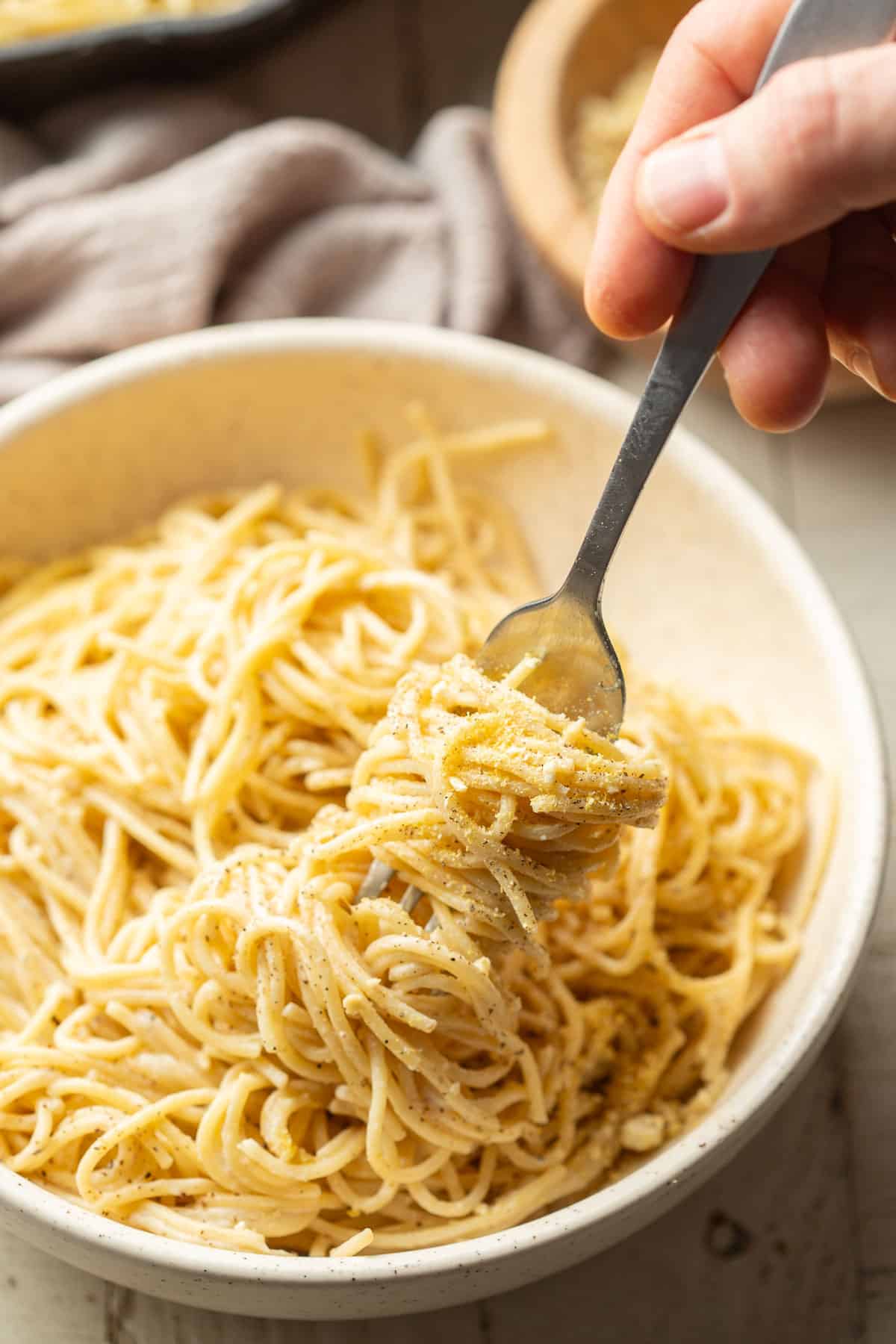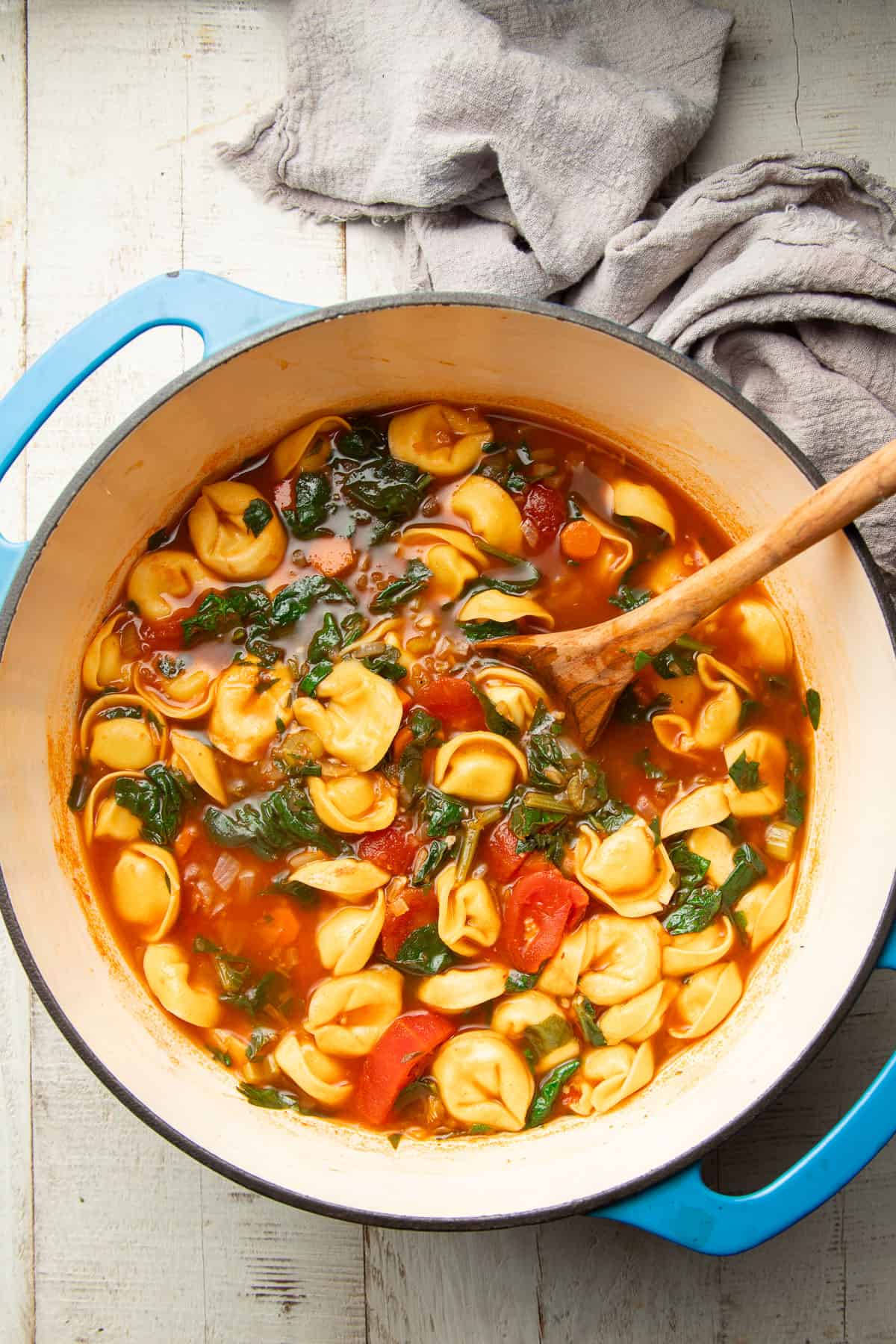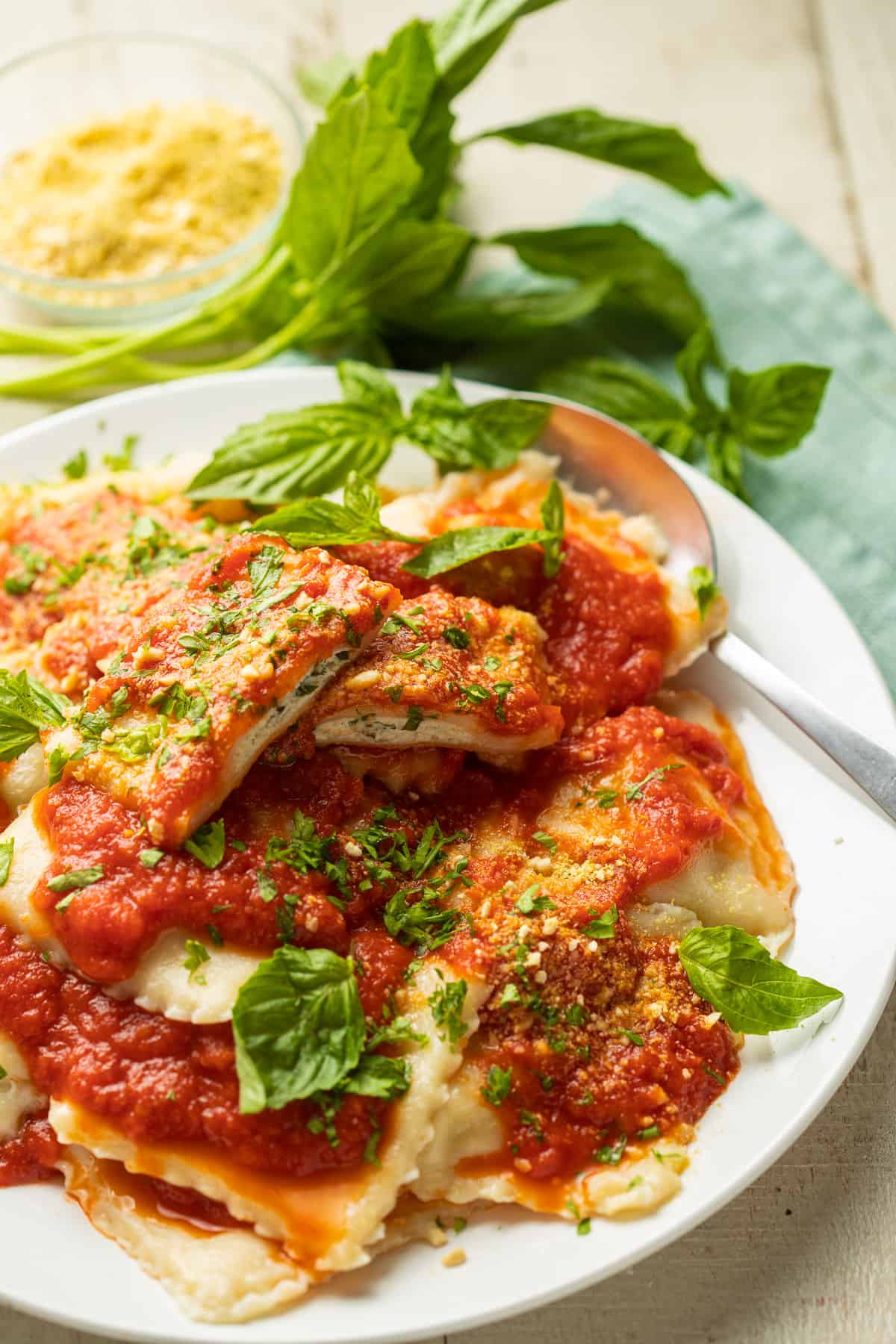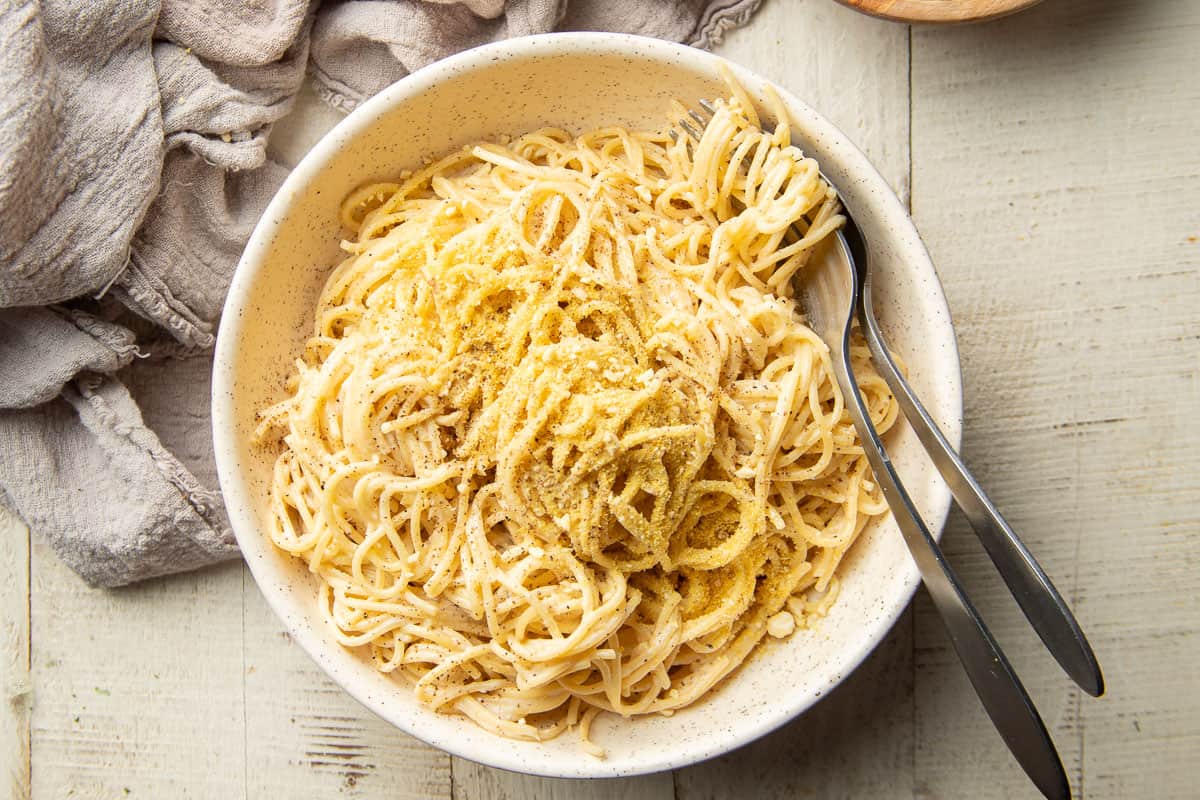Is pasta vegan? Like so many questions in life, it depends! Read on to get all the details on which pasta varieties are suitable for a vegan diet.
Are you wondering whether you can eat pasta while on a plant-based diet? The simple answer is yes, you can! Most types of pasta are vegan. Traditionally, pasta noodles are made from durum, semolina, or wheat flour, and water, making them totally vegan-friendly.
But, be careful! Some noodles are dairy and egg-based. That is why it’s important to always read the package information to check the ingredients used to make your pasta. It’s also important to check if the sauces and stuffings in your pasta dishes are dairy-free, egg-free, and meatless.
Ravioli and tortellini are usually stuffed with cheese or ground meat. Pasta sauces are also often made with cream, butter, or cheese — especially white sauces like Alfredo and carbonara.
The good news is that these components are easy to veganize without sacrificing taste, texture, and quality. Check out our Vegan Fettucine Alfredo, Vegan Spaghetti Carbonara, Vegan Vodka Sauce, and Pasta with Mushroom Bolognese for a few examples. Most of the time, a few simple ingredient swaps are all you need!
Jump to:
Dried Pasta

Since most of us don’t make pasta from scratch, we rely on packed dried pasta found grocery stores and supermarkets. While most commercial brands are vegan, there are a few exceptions that you need to watch out for:
- Specialty and high-end dried pasta. Also known as artisanal pasta, these pastas are made from higher-quality ingredients compared to mass-produced varieties. Some of these brands might include dairy or eggs to enhance texture and flavor.
- High-protein pasta. This type of pasta is popular among those who need an extra boost of protein in their diet. High-protein pasta is often made with whey, a liquid byproduct of dairy products like cheese. Fortunately, in recent years many brands have begun moving away from using whey and switched to bean flours. This is a great news, because these pastas are typically vegan and often gluten-free too!
- Egg noodles. This one is pretty obvious, but still worth mentioning. You might not always realize that you’re consuming egg noodles in dishes like soups and casseroles. Again, always check the ingredient list or ask your server to be on the safe side!
Since most dried pasta are vegan-friendly, you have a wide variety to choose from, including all of the classic pasta shapes, like spaghetti, penne, linguine, fettuccine, farfalle, and even shelf-stable gnocchi.
Fresh and Frozen Pasta
Watch out for these! Whether you’re buying your pasta at the store, or eating at a restaurant, you need to be careful when consuming fresh or frozen pasta. These varieties often include eggs to give the pasta a smoother surface, richer flavor, and light golden color. Eggs are often also used a binder to keep the pasta strands intact when boiled.
Be especially careful in restaurants, where the menu probably won’t even indicate that the pasta is freshly made.
Eggs are by no means a required ingredient though, and they can easily be replaced with oil or omitted entirely. So look for pastas labelled as vegan, check ingredient lists, and ask your server what’s in the pasta before you order.
Filled Pasta

The pasta dough used to make filled pastas like ravioli and tortellini is often vegan, usually being made from wheat flour. But unfortunately, the fillings usually aren’t. Traditionally, ravioli and tortellini are stuffed with cheese, meat, and seafood, which makes them a big no-no for vegans. Ready-to-eat, frozen filled pastas are also packaged with sauces that may not be suitable for a plant-based diet.
But vegan options are slowly starting to pop up on store shelves! These pastas are stuffed with fillings like dairy-free cheese, vegetables like spinach or mushrooms, plant proteins, and mock meats.
Here are some vegan filled pasta brands that we like:
- Kite Hill. This brand offers a plethora of vegan goodies, like yogurts, dips, cheese alternatives, and of course, filled pasta. They have spinach, mushroom, dairy-free ricotta, and butternut squash filled tortellini and ravioli to choose from. Kite Hill’s products are also non-GMO, and soy-free with no artificial flavors and preservatives.
- Soy Boy. This vegan food brand produces primarily tofu and tempeh, but they also have some vegan stuffed pasta offerings! Soy Boy currently offers two types of tofu ravioli, including their original tofu ravioli, made of durum flour dough and seasoned organic tofu stuffing, as well as their ravioli verde, which is made from spinach dough with an herb-seasoned organic tofu filling.
- Wegman’s. This supermarket chain offers its own line-up of vegan foods! Their vegan stuffed pasta choices include organic butternut squash ravioli and organic spinach ravioli with mushrooms.
- Whole Foods. Whole Foods Market offers so many vegan food options, it should come as no surprise that they carry their own brand of vegan ravioli, which is stuffed with a delicious mix of veggies including mushrooms, artichoke hearts and kale.
If you’re looking to give store-bought vegan stuffed pasta a try, consider cooking up a batch of our vegan tortellini soup, which was developed using Kite Hill’s vegan tortellini.
And if you can’t find vegan filled pasta at the store, make your own! Give our homemade vegan ravioli pomodoro a try. The ravioli are made from homemade pasta dough stuffed with a basil, tofu, and cashew filling that you’d never know was dairy-free.

Common Ingredient Swaps to Make Your Pasta Dishes Vegan
Veganizing a traditional non-vegan pasta dish is surprisingly easy. Here are some simple ingredient substitutions you can use to make your pasta (or many other dishes, for that matter) completely vegan!
- Milk. Instead of using dairy milk, use plant-based milk alternatives such as almond milk, soy milk, oat milk, cashew milk, and coconut milk. Check out our guide to dairy-free milks if you’re not sure which one to use.
- Cream. Try replacing this with coconut milk or cashew cream.
- Butter. Use non-dairy butter, which is made from coconut oil, palm oil, or canola oil. Some popular brands include Earth Balance, Melt and Miyoko’s.
- Meat. Swap out the meat with with protein-rich plant-based ingredients like edamame, lentils, chickpeas, broccoli, asparagus, beans, and artichokes, tofu, tempeh, seitan, and mock meats.
- Cheese. Try using store-bought vegan cheese, or our homemade vegan ricotta cheese cheese, vegan Parmesan cheese, and vegan mozzarella cheese. Even just a sprinkle of nutritional yeast is a great way to add savory, cheesy flavor to your pasta dishes.
- Eggs. When it comes to making homemade pasta dough, you can simply omit eggs from most recipes. When making pasta sauce, some replacements that may be used include aquafaba (this is the liquid from canned chickpeas), pureed silken tofu, blended raw cashews, or cornstarch dissolved in water.
Things to Remember
- Not all pasta is vegan.
- Always check the package information for non-vegan ingredients when buying pasta.
- When dining out, never assume that the pasta is vegan. Some restaurants use fresh pasta that contains eggs. Ask the server for more information before ordering.
- Pasta sauces may or may not be vegan. Some use milk, cream, butter, animal fats, or eggs for flavor and consistency. Stick with sauces that are tomato, oil, or vegetable based, or vegan versions of creamy sauces.
- Traditional filled pastas are stuffed with cheese and meat. Look for brands that are 100% vegan!
- If you’re looking for some delicious plant-based pasta dishes to try, check out our collection of vegan pasta recipes.
Frequently Asked Questions
Generally, no. Most vegan pastas are not gluten-free. Pasta that is made from wheat and semolina (which most are) contains gluten. If you’re looking for pasta that’s both vegan and gluten-free, try brown rice pasta, quinoa pasta, or chickpea pasta.
Barilla, Banza, De Cecco, DeLallo, Ronzoni, and Jovial Foods are some popular pasta brands with vegan options. But keep in mind that these are not entirely vegan-centric brands, so they may have some pasta varieties that contain animal products. Always check the ingredients.
Like this post? Let me know in the comments! Also be sure to follow me on Facebook, Pinterest or Instagram, or subscribe to my newsletter for more tips!
